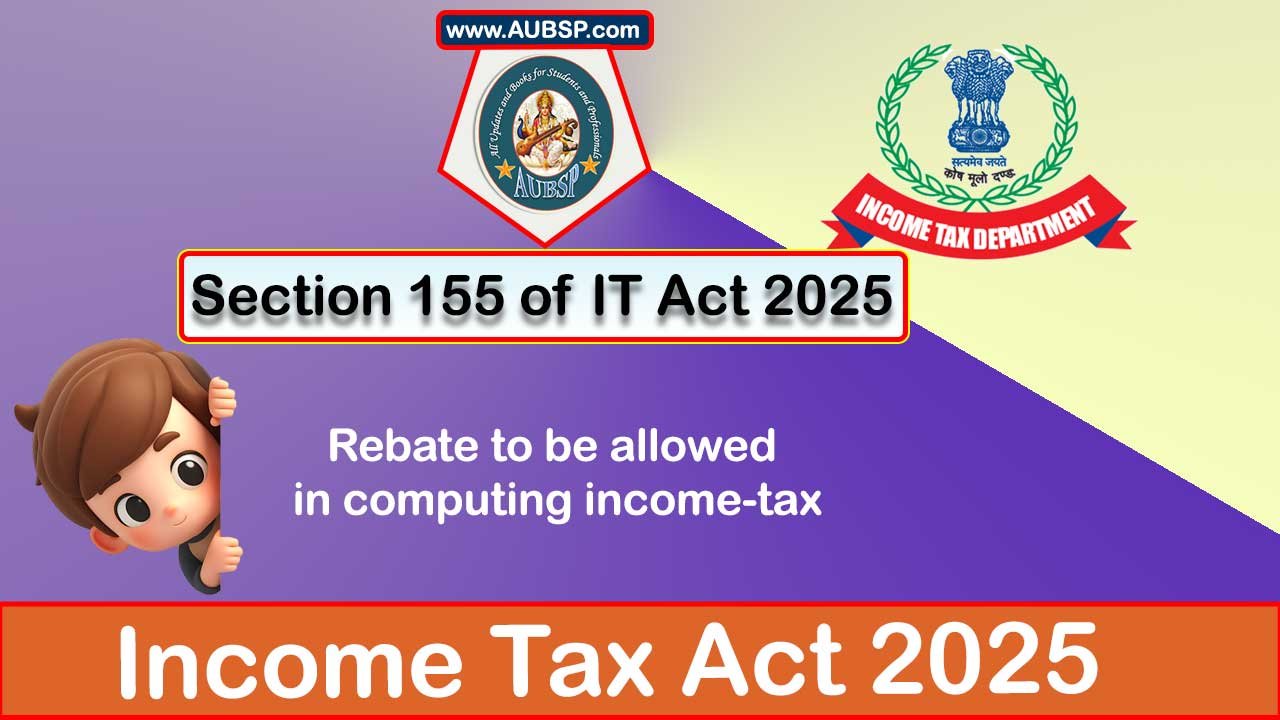Rebate to be allowed in computing income-tax
[Section-155 as per the Income Tax Act, 2025 (this Act) w.e.f. 1st April, 2026.]
Section 155(1) of Income Tax Act 2025
155(1) In computing income-tax on the total income of an assessee with which he is chargeable for any tax year, there shall be allowed from income-tax (as computed before allowing the deductions under this Chapter), subject to the provisions of section 156, the deductions specified therein.
Section 155(2) of Income Tax Act 2025
155(2) The deduction under section 156, shall not, in any case, exceed income-tax (as computed before allowing the deductions under this Chapter) on the total income of the assessee with which he is chargeable for any tax year.
FAQs on Section 155 of Income Tax Act 2025
What is the purpose of Section 155 of the Income Tax Act, 2025?
Section 155 provides for the allowance of a rebate (deduction) from the income-tax computed on an assessee’s total income, subject to the provisions of Section 156.
When is the rebate under Section 155 allowed?
The rebate is allowed while computing income-tax on the total income chargeable for any tax year, before allowing any other deductions under the same Chapter.
What does Section 155(1) specifically provide?
Section 155(1) states that from the income-tax calculated on the total income of an assessee, deductions specified in Section 156 shall be allowed, before any other deductions under the Chapter.
What is the condition for allowing deduction under Section 155?
The deduction is allowed only if it is specified under Section 156 and must comply with all conditions laid out in that section.
What is meant by ‘income-tax as computed before allowing deductions under this Chapter’?
It refers to the gross tax liability computed on the total income before considering any rebate or deduction provided in Chapter XV.
What does Section 155(2) restrict?
It restricts the amount of deduction under Section 156, ensuring that it does not exceed the total income-tax computed before applying any rebate or deduction under this Chapter.
Can the rebate under Section 156 reduce the tax liability to zero or a refund position?
Yes, but only to the extent that the rebate does not exceed the original income-tax computed on the total income; it cannot lead to a negative tax liability.
Does Section 155 itself provide any specific deduction amounts or conditions?
No, Section 155 only enables the deduction; the specific provisions, amounts, and conditions are laid out in Section 156.
Is the rebate under Section 155 applicable to all taxpayers?
Yes, it applies to any assessee, subject to eligibility conditions under Section 156.
Is the deduction automatic under Section 155?
No, it is subject to conditions under Section 156 and must be claimed appropriately during return filing.
Can more than one deduction be claimed under Section 155?
Only those deductions specified in Section 156 can be claimed, and the total of such deductions cannot exceed the computed income-tax.
Will the rebate affect surcharge or cess computation?
The rebate under Section 155 applies before computing surcharge and cess, as those are calculated on net income-tax payable after deductions.
Is Section 155 applicable for tax computation under presumptive taxation?
Section 155 does not specifically exclude any category of assessee, so if presumptive taxpayers are eligible under Section 156, they may claim it.
How does Section 155 ensure that deductions do not exceed tax liability?
Section 155(2) explicitly states that the deduction cannot exceed the income-tax computed before any deduction, capping the benefit at the actual tax amount.

